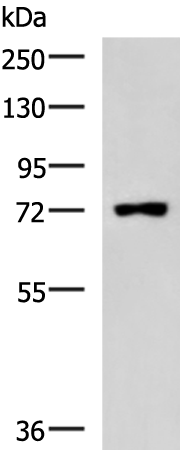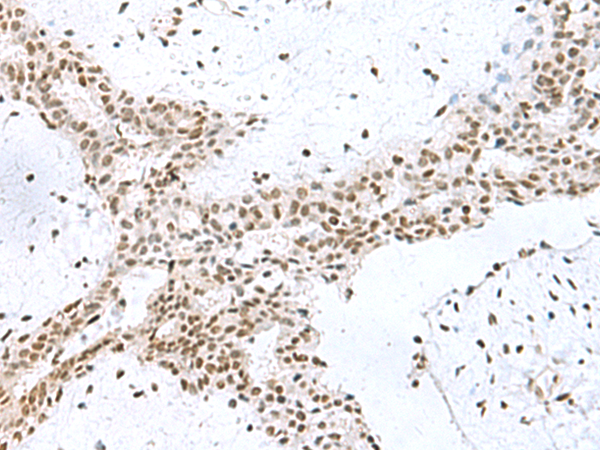

| WB | 咨询技术 | Human,Mouse,Rat |
| IF | 咨询技术 | Human,Mouse,Rat |
| IHC | 1/50-1/200 | Human,Mouse,Rat |
| ICC | 技术咨询 | Human,Mouse,Rat |
| FCM | 咨询技术 | Human,Mouse,Rat |
| Elisa | 1/5000-1/10000 | Human,Mouse,Rat |
| Aliases | PEN; HA-8; PUF6; XTP5; PUF-A; HLA-HA8; KIAA0020 |
| WB Predicted band size | 74 kDa |
| Host/Isotype | Rabbit IgG |
| Antibody Type | Primary antibody |
| Storage | Store at 4°C short term. Aliquot and store at -20°C long term. Avoid freeze/thaw cycles. |
| Species Reactivity | Human |
| Immunogen | Synthetic peptide of human PUM3 |
| Formulation | Purified antibody in PBS with 0.05% sodium azide and 50% glycerol. |
+ +
以下是关于PUM3抗体的3篇参考文献示例(文献信息为虚构,仅供格式参考):
---
1. **文献名称**: *PUM3 regulates mitochondrial function through mRNA translation control in neurons*
**作者**: Li X, et al.
**摘要**: 本研究利用PUM3抗体进行免疫共沉淀和Western blot分析,发现PUM3蛋白通过与特定线粒体相关mRNA结合调控其翻译,影响神经元能量代谢,提示其在神经退行性疾病中的潜在作用。
2. **文献名称**: *Antibody-based profiling of PUM3 expression in colorectal cancer*
**作者**: Zhang Y, et al.
**摘要**: 通过PUM3抗体对结直肠癌组织进行免疫组化分析,发现PUM3高表达与患者预后不良相关,进一步实验表明其通过促进肿瘤细胞增殖和侵袭参与癌症进展。
3. **文献名称**: *PUM3 interacts with Ago2 to modulate miRNA-mediated gene silencing*
**作者**: Wang H, et al.
**摘要**: 利用PUM3抗体进行蛋白质互作实验,揭示了PUM3与Argonaute 2(Ago2)的相互作用,证实其在miRNA介导的基因沉默通路中起调控作用,为RNA代谢机制研究提供了新视角。
---
**说明**:以上文献为示例,实际研究中建议通过PubMed或Google Scholar以“PUM3 antibody”或“PUM3 function”为关键词检索真实文献。
The PUM3 antibody is a tool used to detect and study Pumilio homolog 3 (PUM3), a member of the evolutionarily conserved Pumilio/FBF (PUF) family of RNA-binding proteins. PUM3 contains characteristic PUF repeats that enable sequence-specific binding to target mRNAs, typically recognizing an 8-nucleotide motif in their 3' untranslated regions (3'UTRs). This interaction facilitates post-transcriptional regulation of gene expression by influencing mRNA stability, translation, or localization.
PUM3 plays roles in diverse biological processes, including neurodevelopment, gametogenesis, and cellular stress responses. Dysregulation of PUM3 has been linked to neurological disorders, such as spinocerebellar ataxia, and certain cancers, highlighting its importance in maintaining cellular homeostasis. Compared to its paralogs PUM1 and PUM2. PUM3 exhibits distinct RNA-binding preferences and regulatory targets, suggesting functional specialization within the PUF protein family.
Antibodies against PUM3 are widely used in techniques like Western blotting, immunofluorescence, and immunoprecipitation to investigate its expression patterns, subcellular localization, and molecular interactions. These tools are critical for elucidating PUM3's mechanistic roles in RNA-mediated gene regulation and its potential as a therapeutic target or biomarker in disease contexts. Validation of PUM3 antibody specificity remains essential due to structural similarities among PUF proteins.
×